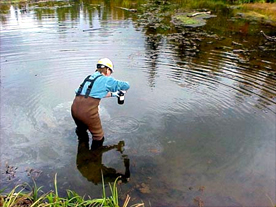Water Quality Sampling
The Provincial standards for water suitable for recreational use are bacterial counts of 1000 colonies of total coliform and 100 colonies of E. coli per 100 ml. of water. This limit has been raised over the years in response to public pressures to keep beaches open in the face of deteriorating water quality, especially in the more urban areas.
The goal set by The Township of the Archipelago is 10 units of total coliform and <3 units of E. coli. It is a given that cases of illness rise as bacterial counts in our waters rise, and often disproportionately. This being said, based on four years of intensive bacterial monitoring throughout the Township of Georgian Bay and the Township of Archipelago 100 TC and 10 EC would be a realistic and quite acceptable standard for these relatively pristine waters at this time.
The numbers recorded in the reports linked on the right indicate the most probable numbers of colony forming units of bacteria, total coliform and E. coli, per 100 ml. sample of water. The number 2424 is beyond the upper limits of the scale and indicates that the total number of colonies is too high to be counted. We have ceased to presume that any open bodies of water are free of bacteria, thus a zero reading on our test plates is now recorded as <3 (fewer than three) colonies. In these cases there was no observable indication of E. coli or total coliform.
Bacterial levels in open bodies of water can fluctuate enormously from day to day. Bacterial levels in random samples such as those taken in our Township's water quality program are not to be taken as an indication, good or poor, as to the condition of the water at a particular site at any time other than when that sample was taken. Thus, open bodies of water are NOT considered to contain potable water.
We monitor 10 sites in the South Channel on a regular basis. We are currently testing at approximately two week intervals over the cottage season. Other sites around the South Channel are tested on an occasional basis over the season. We are always on the lookout for "hot spots", especially regular transient boat mooring sites.

